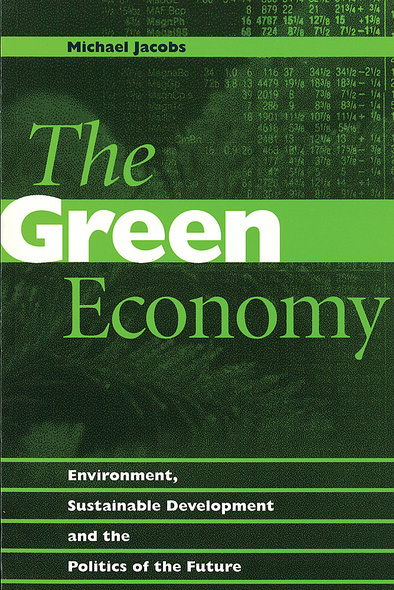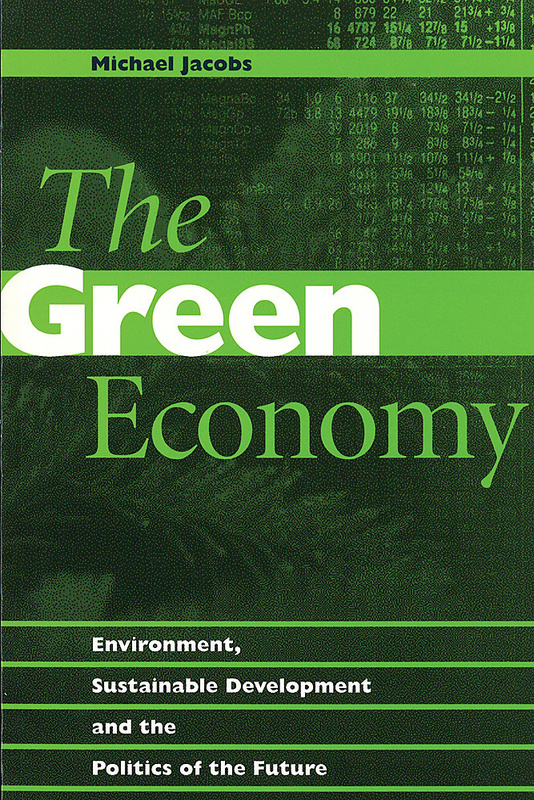The Green Economy
Environment, Sustainable Development and the Politics of the Future
The current controversy over the future of the forest in ClayoquotSound is seen by many as typifying the unsolvable conflict between jobsand the environment. In The Green Economy, Michael Jacobsrejects both the traditional Green demand for 'zero growth' andthe new economic orthodoxy which seeks to give the environment amonetary value. In their place, he defines the concept of'sustainability,' as founded in a concern for futuregenerations.
But what is sustainable development? How can it be achieved? Jacobsexplores these questions by analyzing the economics of theenvironmental crisis, showing how the operation of the 'invisibleelbow' of market forces tends to cause environmental degradation.He highlights the key issues, both between rich and poor countries andbetween present and future generations.
Jacobs then sets out a system of 'sustainability' planning,devised to constrain the economy within environmental limits. He showshow 'green taxes' and other financial incentives, publicspending, and the implementation of regulations must be combined toachieve those objectives.
This book belongs to a tradition of political economy at its best,analytically rigorous, yet informed by both the deep ethical concernsof the Green movement and an awareness of the social and politicalcontext of economic policy. Written for the non-specialist in clearprose, it offers a radical yet feasible agenda for the 1990s andbeyond.
Cogent and persuasive ... stands out on the expanding shelves of Green literature.
Michael Jacobs is one of the most talented and innovative writers in the environmental movement of the 1990s.
Jacobs takes the reader through a thorough and cogent treatment of virtually all the main questions currently at issue in the field of environmental economics. In a field rife with ideological polemic from both critics and defenders of 'economic approaches' to environmental problems, it is refreshing to read a clear and even-handed discussion of the issues. Readers interested in the economics and politics of the environment will find themselves both more knowledgeable and more thoughtful about the economics and politics of the environment after reading this book.
Introduction
Part I: Analysis
1. The Economy and the Environmental Crisis
2. Whose Environment?
3. The Invisible Elbow: Market Forces and EnvironmentalDegradation
4. Capitalism, Industrialism and Green Politics
Part II: Objectives
5. Sustainable Development: Beyond 'Zero Growth'
6. Valuing the Environment: The 'Orthodox Economists's'Approach to Environmental Protection
7. Sustainability: Protecting the Future
8. Making Sustainability Operational: The Meaning of'Environmental Capacity'
9. Environmental Efficiency, Entropy and Energy
Part III: Programme
10. Sustainability Planning
11. Instruments for Environmental Protection
12. Regulations versus Financial Incentives?
13. The Role of Government Expenditure
14. Equity and the Integration of Social and EnvironmentalPolicy
15. Global Environmental Economic Policy
Part IV: Measurement
16. Making Environmental Decisions (1): The Limits of Cost-BenefitAnalysis
17. Making Environmental Decisions (2): Monetary Valuation of theEnvironment
18. Measuring Success
19. The Standard of Living and the Quality of Life
Notes
Bibliography
Index






